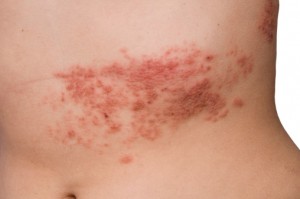

 Shingles risk can increase with inflammatory bowel disease (IBD), according to the research. A cohort study of 108,604 patients has found that the risk of contracting herpes zoster risk is greater in IBD patients than non-IBD patients. Those taking antitumor necrosis factor-alpha agents (TNF) were found to be particularly prone to the virus.
Shingles risk can increase with inflammatory bowel disease (IBD), according to the research. A cohort study of 108,604 patients has found that the risk of contracting herpes zoster risk is greater in IBD patients than non-IBD patients. Those taking antitumor necrosis factor-alpha agents (TNF) were found to be particularly prone to the virus.
Herpes zoster (HZ) infection, also known as shingles, is associated with significant incidence rates and substantial costs. There are close to a million cases in the United States each year. Infection causes a painful, blistering rash usually isolated to one or adjoining dermatomes (skin areas mainly supplied by a single spinal nerve).
Post-herpetic neuralgia, the pain syndrome that can last from months to years after the initial HZ rash without very effective treatments, is found in approximately 10 to 18 percent of cases. The likelihood of prolonged pain increases in those over the age of 50. Other complications that can arise include bacterial skin infection, ocular complications, motor neuropathy and meningitis. HZ is caused by reactivation of latent varicella zoster virus that causes chicken pox.
IBD involves chronic inflammation of all or part of your digestive tract. It primarily includes ulcerative colitis and Crohn’s disease. Both usually involve severe diarrhea, pain, fatigue, and weight loss. IBD can be debilitating and sometimes leads to life-threatening complications. Anti-tumor necrosis factor (anti-TNF) drugs are a class of drugs that are used worldwide to treat inflammatory conditions such as rheumatoid arthritis and IBD.
The nested case-control study aiming to determine the independent effects of medication use (immunosuppressive agents, biological anti-TNF therapy, and corticosteroids) on zoster risk was conducted on patients under 64 years old with at least 12 months of continuous health plan enrolment and access to anti-TNF medication.
The cohort included 50 932 patients with Crohn’s disease, 56 403 patients with ulcerative colitis, and 1269 with unspecified IBD. The IBD cohort was found to be at an increased herpes zoster risk, compared with non-IBD patients.
There is no cure for shingles, but treatment can help ease your symptoms until the condition improves. In many cases, shingles gets better within two to four weeks.
If you develop the shingles rash, there are a number of things you can do to help relieve your symptoms, such as:
Calamine lotion has a soothing, cooling effect on the skin and can be used to relieve the itching. Some people with shingles may also be prescribed antiviral medication to take for seven to 10 days. Although this will not cure the virus, it can prevent it from multiplying. It may also reduce the length, severity, and any further complications. It is advised to take this medication within 72 hours of contracting the virus.
Some remedies for IBD (inflammatory bowel disease) include:
It is important to understand the associated risks of contracting herpes zoster in people who have IBD and are taking anti-TNF agents as treatment medication. This study is especially important as the treatment for IBD illnesses such as Crohn’s disease and ulcerative colitis is continually changing. Methods for treating such inflammatory diseases increasingly suggest aggressive treatment medications sooner. If you are currently suffering from IBD and taking anti-TNF medication, consider the above treatment options for healing your IBD naturally and in addition to medication. Shingles may be a potential virus you can avoid by adjusting your lifestyle.
Copyright © www.orthopaedics.win Bone Health All Rights Reserved